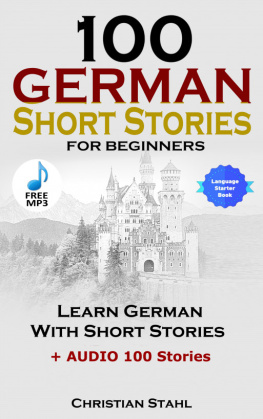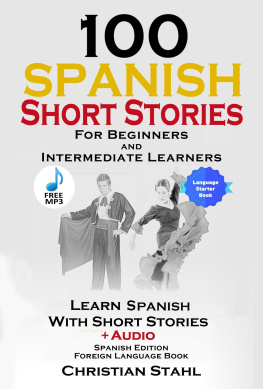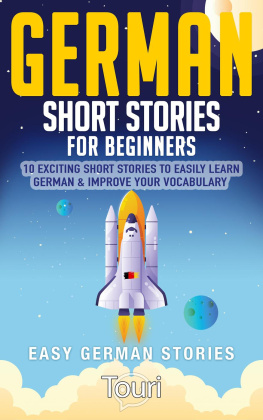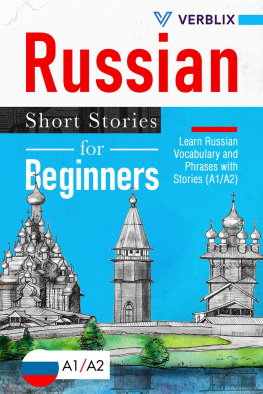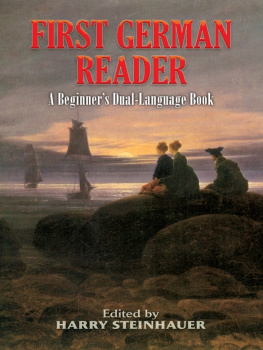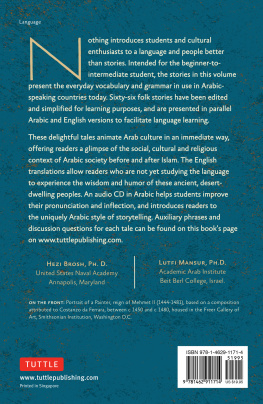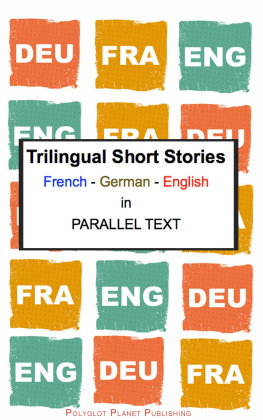100 German Short Stories for
Beginners
Learn German with Stories
+ Audio 100 Stories
Christian Stahl
Copyright 2017 by Christian Stahl - All rightsreserved
License Notice
This document is geared towards providing exact andreliable information in regards to the topic and issue covered. Inno way is it legal to reproduce, duplicate, or transmit any part ofthis document in either electronic means or in printed format.Recording of this publication is strictly prohibited and anystorage of this document is not allowed unless with writtenpermission from the publisher and author.
All rights reserved
The information provided herein is stated to betruthful and consistent, in that any liability, in terms ofinattention or otherwise, by any usage or abuse of any policies,processes, or directions contained within is the solitary and utterresponsibility of the recipient reader. Under no circumstances willany legal responsibility or blame be held against the publisher forany reparation, damages, or monetary loss due to the informationherein, either directly or indirectly. All names and situations arefictional and not related to real persons or events. Theinformation herein is offered for informational purposes solely,and is universal as so. The presentation of the information iswithout contract or any type of guarantee assurance.
Table of Contents
Learning German through short stories
Reading culturally interesting andentertaining short stories to enhance your German is an easy way toimprove your German language skills. This book contains a selectionof 100 short stories for beginners with a wide range of genres, allprepared specifically for German language learners. The aim of thisbook is to teach different German vocabulary and phrases associatedwith short stories, and to improve your German language skills in ashort period of time.
Advance as you read
Each ofthe first 80 short stories take about 2 minutes to read and averageabout 150 to 200 words. Important words and phrases relevant toeach topic were carefully selected. The stories 80 to 100 arelonger and slightly more advanced in terms of vocabulary. They arefollowed by multiple choice questions and answers. The stories 80to 90 come with English parallel text, take about 3 to 4 minutes toread, and contain some of the vocabulary from the previous stories.The last 10 stories take about 4 to 5 minutes to read and consistof most of the previously mentioned vocabulary.
All stories are written by a German linguistand native speaker to ensure you can learn from authentic materialwhile fine-tuning your German vocabulary and improving yourcomprehension.
The content is intended mainly for elementaryto intermediate level learners, but it will also be useful for moreadvanced learnes as a way of practicing their reading skills andcomprehension of the German language. The stories have beenarranged according to their degree of difficulty and each story isaccompanied by a key vocabulary section and story relatedquestions.
Using this book effectively
For theabsolute language beginner it's probably more beneficial if youlisten to the stories first, and then reading aloud. Then reviewthe key-vocabulary section and reread the story once more or untilyou get a grasp of the story.
Vocabulary will be introduced to you at areasonable pace, so youre not overwhelmed with difficult words allat once. Here, you wont have to look up every other word, but youcan simply enjoy the story and absorb new words simply from thestorys context. To learn German effectively you just read eachGerman story at a time and study the vocabulary after reading.
The German contained in here are writtenusing easy-to-understand grammar and vocabulary that both, thoseat the beginner and intermediate levels can understand, appreciate,and learn from.
Some stories are focused on dialogue. Thesestories contain loads of natural dialogue, so you can learnconversational German as you read. This is doubly beneficial as youwill improve your speaking ability as well. Over time, you willbuild an intuitive understanding of how German functions. Thisdiffers from a more theoretical understanding put together vialearning rules and conceptual examples.
Audio in MP3 Format
At theend of this book, after the last story, you can find the downloadlink for the audio file. You get access to 2 mp3 files that includethe 100 short stories of the book. 40 stories are recorded by amale voice and 60 recoreded by a female voice. (Both from Germannative speakers in High German)
1. Ich mchte Lehrerin werden
Sabine geht noch zu Schule. Ihr Lehrer fragtdie Schler, was sie in Zukunft machen wollen.
Welchen Beruf wollt ihr inZukunft haben", fragt der Lehrer.
Michael hebt den Arm. Ich mchte Arztwerden. Dann kann ich die Krper aufschneiden und sehe, wasdrin ist."
Lukas hebt den Arm. Ich mchte Polizistwerden. Dann kann ich bse Menschen erschieen".
Nicole lacht und sagt: Ich mchte Pilotinwerden, dann bin ich frei wie ein Vogel".
Endlich ist Sabine dran. Ich mchteLehrerin werden. Ich mchte den Schlern helfen eine guteEntscheidung zu treffen, was sie in Zukunft machen wollen.
Lernfragen
Welche Fragen stellt der Lehrer?
Was mchte Lukas von Beruf werden?
Warum mchte Sabine Lehrerin werden?
Vokabeln
die Schler: the students / pupils Ider Beruf: the profession I die Zukunft: the future Iaufschneiden: to cut open I bse Menschen: bad peopleI frei: free I der Vogel: the bird I dieLehrerin: the teacher I Eine gute Entscheidung: a gooddecision
2. Eine glcklich Ehe
Mein Name ist Berta. Seit fast acht Jahrenbin ich mit Helmut verheiratet. Mein Mann ist einerfolgreicher Geschftsmann und ich bin Hausfrau.Kinder haben wir nicht, aber wir unternehmen viel zusammen. MeinMann ist sehr romantisch und auch sehr frsorglich. Allerdings sindwir auch unterschiedlich. Mein Mann ist ein Sportler,regelmig geht er ins Fitness Studio. Ich stehe spter aufund verbringe den Vormittag mit Fernsehen.
Leider habe ich auch bergewicht. Ichhabe meinen Mann versprochen eine Dit zu machen. Neulich kamHelmut frh nach Hause. Ich hrte nicht, als er ins Haus kam. Ererwischte mich, als ich gerade im Keller Sigkeiten a.
Lernfragen
Was ist Bertas Mann von Beruf?
Was macht Berta vormittags?
Was hat Berta ihren Mann versprochen?
Vokabeln
Eine glckliche Ehe: a happy marriageI Geschftsmann: business man I die Hausfrau:housewife / homemaker I regelmig: regularly Ibergewicht: overweight I erwischen: to catch so. Ider Keller: the basement I Sigkeiten: sweets
3. Das erste Mal in Deutschland
Ich bin das erste Mal in Deutschland.Heute Morgen bin ich mit dem Zug angekommen. Ich werde frein Jahr in Deutschland bleiben. Das Land ist sehr gutorganisiert. berall gibt es ffentlicheVerkehrsmittel und die Straen sind sehr sauber. DieSupermrkte sind gut sortiert. Ich finde, dass die Deutschen sehrdiszipliniert sind. Pnktlichkeit ist in Deutschland sehrwichtig. Aber viele Sachen sind auch verboten. Sonntags sindviele Geschfte geschlossen. Die Deutschen sind sehrhflich. In meinem Land sind die Menschen sehr freundlichund herzlich. Ich bin nach Deutschland gekommen, um Arbeitzu finden.
Lernfragen
Wie sind die Straen in Deutschland?
Was ist in Deutschland wichtig?

